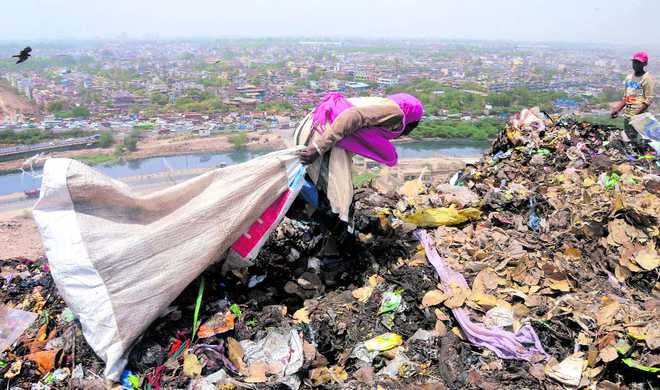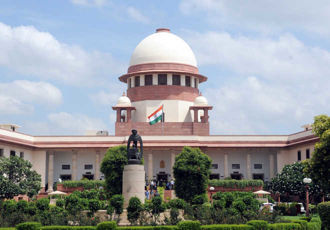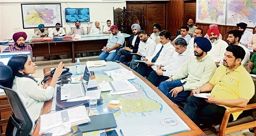
Welcome to DELHI: A ragpicker looks for recyclable material at the Mukarba Chowk landfil site in North Delhi. Mukarba Chowk is the entrance to Delhi from Haryana. tribune photo mukesh aggarwal
Jasmine Singh in Chandigarh
Two years ago, Harnik Atta, a lower caste Jatt from the village Ramidi (Kapurthala), dug a pit outside his house the day the sarpanch told villagers they would get money to build toilets under the Swachh Bharat Abhiyan. He waited for the first installment so that he could build a wall and a pucca toilet for his family. Today, his family has filled the pit with sand so that it doesn’t present any danger.
It was 2014, Prime Minister Narendra Modi announced ‘Swachh Bharat Abhiyan’. A part of this ambitious campaign is to make India open defecation free by 2019: it means building over one crore toilets. While 98.56 lakh toilets were built in rural areas between April 1, 2015 and Feb 29, 2016, another 10.63 Lakh toilets were constructed in urban areas by March 1, said the Swachh Bharat Report 2016, which was conducted between May and June 2015 to look into the problems of the Mission.
This is despite the fact that local civic bodies and panchayats are under tremendous pressure to build toilets.
Baljit Singh, sarpanch of Ramidi village, is hopeful. “Villagers who opted to build toilets and have submitted their Aadhar card, bank account details and filled the required form have already received two instalments of Rs 5,000 each. Only two families in our village have not used this money for the purpose.”
Does that mean there is a lack of support for the cause? Over to Gurdaspur.
Hardev Bains from village Shahpur is happy having built a toilet for his family of 8. Lately they have locked the toilet because they are expecting guests from Canada, and they don’t want the toilet to get dirty. “From the first installment that we got, we made the chaar diwari (four walls) of the toilet. From the second, we installed the seat, now we have no money for water and electricity supply. We dug another bore for temporary water supply to the toilet, but now we are not using it. Ek tan ganda ho reha and dusra paani nai anda pura (there is not enough water to keep it clean),” says Hardev.
Manjit Singh Dala, managing director Dala Land Promoters & Builders from Gurdaspur, laughs it off. “A few days back, I went to a government office in Jalandhar; I wanted to use the bathroom. The officer sent his peon with the toilets keys. The peon said: ‘loki ganda kar dinde ne, toilet tanhi band karna painda hai’ (people dirty the toilet, so we have to keep it locked).”
Dala says the Swachh Bharat Abhiyan has many practical problems. “How can you make a toilet with an installment of Rs 5,000? ”
But those working with sanitation feel that it is difficult to convince people. “It is the mind-set that needs to change,” says Ashish Duggal, a member of Swachh Bharat Mission from Dera Baba Nanak.
Vineet Chopra, convenor Swachh Bharat Abhiyan Committee, Moga, took it upon himself to clean his ward. “Along with the community members, I swept the roads of my area for almost a year. I have noticed that people are not open to keeping their surroundings clean and neither do they like being told.”
Another factor is that this Abhiyaan is meant to be demand-driven: toilets are built only when people want. In some cases when the district administration makes toilets, it does not consult the villagers on the location and the operation of the toilets.
Dr Raju Chohan, medical officer, Municipal Corporation, Amritsar, says there is a need to spread the message of clean India rather than impose it blindly.
Dr Raju says a lot needs to be done in Amritsar. “In Amritsar, we identified 8,181 beneficiaries, who would be getting money in two installments of Rs 2,000 and Rs 3,300. Out of the people identified, 6,000 have already started constructing toilets. We asked this section to upload photos of the toilet, and wait for the second installment. Out of 8, 181 beneficiaries, 2,000 have been sent notices for not constructing toilets. This is the least we can do; we can’t force them or punish them.”
In Chandigarh, marshals & fine
The Chandigarh Municipal Corporation has decided not to charge anything for using public conveniences in the city. The MC has deployed marshals to keep a watch on those going for open defecation. Mayor Asha Jaswal is confident that Chandigarh will soon be open defecation-free. “The marshals have been told to visit colonies and villages to explain what Swachh Bharat Mission is all about. We have renovated old toilets and constructed new ones.” Sources say a fine of Rs 5,000-10,000 will be imposed on the residents of the city if they are found throwing garbage outside thr home. A few days back, the toilets near Sector-16, (near Rose Garden) were locked. Today, toilets elsewhere in Chandigarh would be found open after 5 pm. “We are surprised. Has the MC passed a new rule?” asks Surinder Singh, a resident. Two weeks back he had taken his guests to Rose Garden and Sukhna Lake. His American guests were surprised to see the toilets closed. “It was so embarrassing.” Jasmine Singh
What’s common between Amitabh Bachchan, Sachin Tendulkar, Salman Khan and Jwala Gutta? They are brand ambassadors of Swachh Bharat Mission: an ambitious plan to keep India clean. Launched on Oct 2, 2014 with much fanfare, the well-intentioned scheme proposes a yearly, country-wide, independent third-party assessment of the sanitation status of rural areas. The fact is there has been no independent monitoring so far. Between May 1 and May 21, 2017, 489,710 individual household latrines were constructed across the country, data accessed on May 22, 2017 from the Swachh Bharat Mission-Gramin website shows. That’s an average of nearly 25,000 toilets constructed per day. Here is what government agencies are doing with people’s involvement.


























